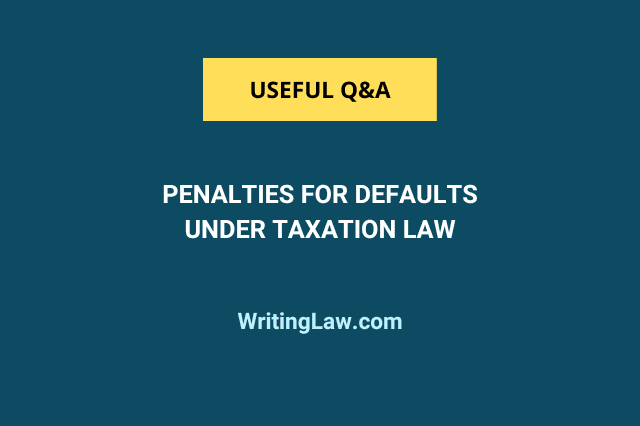
To ensure that taxpayers do not omit their tax obligations, the Income Tax Act of 1961 provides several penalties. A penalty is imposed on a taxpayer as punishment for not complying with the directions of the income tax authorities or provisions of the Income Tax Act. While some of the penalties given under the Income Tax Act are mandatory, some of the penalties are imposed at the discretion of the tax authorities.
Here is an article discussing the several penalties provided under the Indian Income Tax Act of 1962.
Penalties Under the Income Tax Act
The provisions related to penalties leviable under the Income Tax Act are:
1. Penalty for Failing to Pay Taxes on Time
According to section 220(1), if the taxpayer receives a demand notice for the payment of tax (other than advance tax), it must be paid within 30 days of service of the notice at such place and to the person as specified in the notice. The taxpayer is considered an assessee in default if he fails to pay any taxes due on him.
Section 221(1) provides that an assessee in default has to pay a penalty of such amount as the Assessing Officer may direct. And, if the person continues the default, he will be liable for the penalty of such amount as the assessing officer from time to time determines. However, the total amount of penalty in no case should exceed the amount of tax in arrears.
2. Penalty for Delay in Filing TDS/TCS Statement
As per section 234E of the Income Tax Act, a taxpayer who fails to file the statement of Tax Deducted at Source (TDS) or Tax Collected at Source (TCS) on or before the due date prescribed in this regard is liable to pay Rs. 200 for each day till the failure continues, by way of fee. However, the amount of the fee should not exceed the amount of tax-deductible or collectable.
3. Penalty for Default in Furnishing Return of Income
According to section 234F of the Income Tax Act, a person who is required to furnish a return of income under section 139 of the Income Tax Act will be liable to pay a fine of Rs 1000 (if their total income is under Rs 5 lakh), Rs 5000 (if the return is furnished on the last date of the assessment year), or Rs 10,000 (in any other case) if they fail to do so within the stipulated time period.
4. Penalty for Failure to Keep, Maintain, or Retain Books of Account, Documents, etc.
As per section 44AA of the Income Tax Act, every person who practices law, medicine, engineering, architecture, accounting, technical consulting, interior design, or any other profession listed in the official gazette is required to keep and maintain the necessary records of accounts and other documents to allow the Assessing Officer to determine his total income.
According to section 271A of the Income Tax Act, if a person fails to keep, maintain or retain such books of accounts or other documents as required under section 44AA of the said Act, he will be liable to pay a sum of Rs 25,000.
5. Penalty for Initiating False Entry in Books of Accounts
If any fraudulent entry or any omission of any entry in the books of account maintained by any person is discovered during any proceeding under the Income Tax Act, that person will be liable to pay the penalty in an amount equal to the total amount of such false or omitted entry, according to Section 271AAD of the Income Tax Act.
6. Penalty for Failure to Comply With Income Tax Authorities
Sometimes income tax authorities require some information from the assessee (taxpayer). In such a case, the assessee is legally bound to answer questions put forward by the income tax authorities, provide the income tax authorities with their (assessee) signature and provide evidence or books of accounts if a summon is issued.
According to section 272A of the Income Tax Act, if the assessee or the taxpayer refuses to answer any question, sign any statement or provide evidence or record of accounts or other documents, he will be liable to pay a penalty of a sum not less than Rs 500 and not more than Rs 10,000.
7. Penalty in Case of Search
The income tax authorities are empowered with the power to initiate the search. If, at the time of the investigation, the income tax authorities found any undisclosed income, the assessee is liable to pay a penalty which may either be 10% or 20% of the undisclosed income of the specified previous year, depending upon the conditions given under section 271AAB of the Income Tax Act.
Read Next:
1. What Is Tax Evasion?
2. What Are White-Collar Crimes?
3. Understanding Income Tax in India With All Tax Rates
- Understanding the Legislative Branch of the Indian Government - 6th May 2024
- Appointment, Oath, and Removal of Constitutional Posts in India - 28th April 2024
- Powers of Income Tax Authorities in India - 26th April 2024







